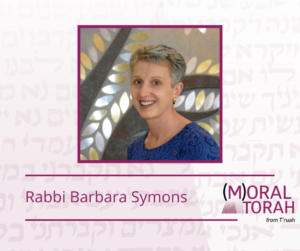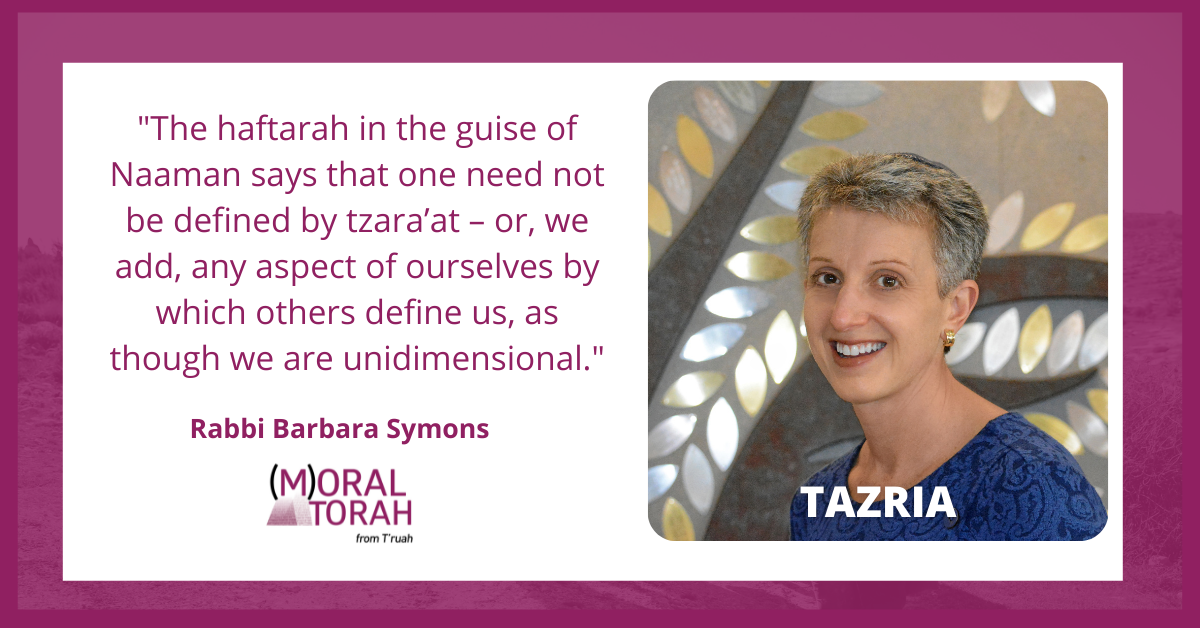A D’var Torah for Parshat Tazria by Rabbi Barbara Symons
Biblical tzara’at is not a pretty sight. It involves colors, raised and sunken skin, white hairs, and more. It means being separated from the community because you are impure. More than that, it requires this: “As for the person with a leprous affection: the clothes shall be rent, the head shall be left bare and the upper lip shall be covered over; and that person shall call out, ‘Impure! Impure!’” (Leviticus 13:45)
What is going on here?? Last week’s portion offers some helpful context. Nadav and Avihu offer “strange fire” and are consumed by it. Afterwards, their father Aaron and their brothers are told by Moses, “Do not bare your heads and do not rend your clothes…” (Leviticus 10:6) We see that both were familiar acts of mourning that they were to abstain from – the latter of which we still do today, though often in the form of a keriah ribbon rather than our actual clothes.
Sign up to receive (M)oral Torah in your inbox each week.
In contrast, baring the head so that hair hung loose was a way of shaming a person – as in the adulterous wife (Numbers 5:18) – as was covering the upper lip (Micah 3:7). To top it off, that person with tzara’at was to call out, “Impure! Impure!” Perhaps that had the purpose of clarifying to anyone near them that they were not in mourning, which might actually bring compassion from others, but rather to shame them.
So which is it, mourning or shaming? I believe that our person with tzara’at was in fact mourning – but not mourning someone else; mourning their former lives, mourning their former selves, mourning the wholeness of self. In accelerated experiential dynamic psychotherapy (AEDP),
Mourning for the self is about not only understanding what we have been through but feeling for ourselves. The consequences of our traumas are huge. Years of life may have been compromised by false beliefs that we were not good enough or worthy of being loved. Beliefs that others could not possibly accept us for our true self, flaws and all, led to loneliness and a feeling of disconnection. Unsatisfying relationships were the norm because we lacked trust in others. Many of us never had the pleasure of being in our bodies, feeling vital and authentic. (Read more on psychologytoday.com.)
I think of how many people around the world, in our neighborhoods, and in our own homes have lost themselves and are in mourning: millions of refugees, millions more who are reeling from Covid’s rampage, people suffering from abuse, those with the illness of addiction, members of the LGBTQ community who are not accepted simply because of their sexuality or gender identity. Sadly, the list goes on and on. These are today’s sufferers of tzara’at.
Find more commentaries on Parshat Tazria.
Enter Naaman in this week’s haftarah: “Naaman, commander of the army of the king of Aram, was important to his lord and high in his favor, for through him the ETERNAL had granted victory to Aram. But the man, though a great warrior, had tzara’at” (II Kings 5:1). Let us allow ourselves to picture Naaman. The words translated as “high in his favor” are the same as those in the final line of the priestly blessing (Numbers 6:26): “God bestows favor” – literally “lifts [God’s] face.” We imagine Naaman wearing the ancient equivalent of today’s stripes and bars of military insignia on his uniform. We see his strength through his physique as well as through his weapons, entourage, and transport. And he had tzara’at. It was the last of his traits to be noted.
The haftarah goes on to tell how a young nameless female Israelite slave tells Naaman’s wife that God’s prophet Elisha could cure him. Arrangements are made and he is told to immerse in the Jordan River. At first mocking the simplicity of the cure, he then immerses and is healed.
 The haftarah complements the Torah portion; it brings the commandments related to tzara’at into three dimensions through a story. It also does something else, something more important. The haftarah in the guise of Naaman says that one need not be defined by tzara’at – or, we add, any aspect of ourselves by which others define us, as though we are unidimensional. Unlike in the Torah portion, we will not be forced to call out “Immigrant! Immigrant!” “Addict! Addict!” “Queer! Queer!” The haftarah, a word that itself means “conclusion,” is the final word on this: it invites us neither to mourn our uniqueness nor to be ashamed but rather to lift our heads.
The haftarah complements the Torah portion; it brings the commandments related to tzara’at into three dimensions through a story. It also does something else, something more important. The haftarah in the guise of Naaman says that one need not be defined by tzara’at – or, we add, any aspect of ourselves by which others define us, as though we are unidimensional. Unlike in the Torah portion, we will not be forced to call out “Immigrant! Immigrant!” “Addict! Addict!” “Queer! Queer!” The haftarah, a word that itself means “conclusion,” is the final word on this: it invites us neither to mourn our uniqueness nor to be ashamed but rather to lift our heads.
Rabbi Barbara Symons serves as the rabbi of Temple David in Monroeville, Pennsylvania and is proud to be the editor of Prophetic Voices: Renewing and Reimagining Haftarah (CCAR Press, Fall 2022).

